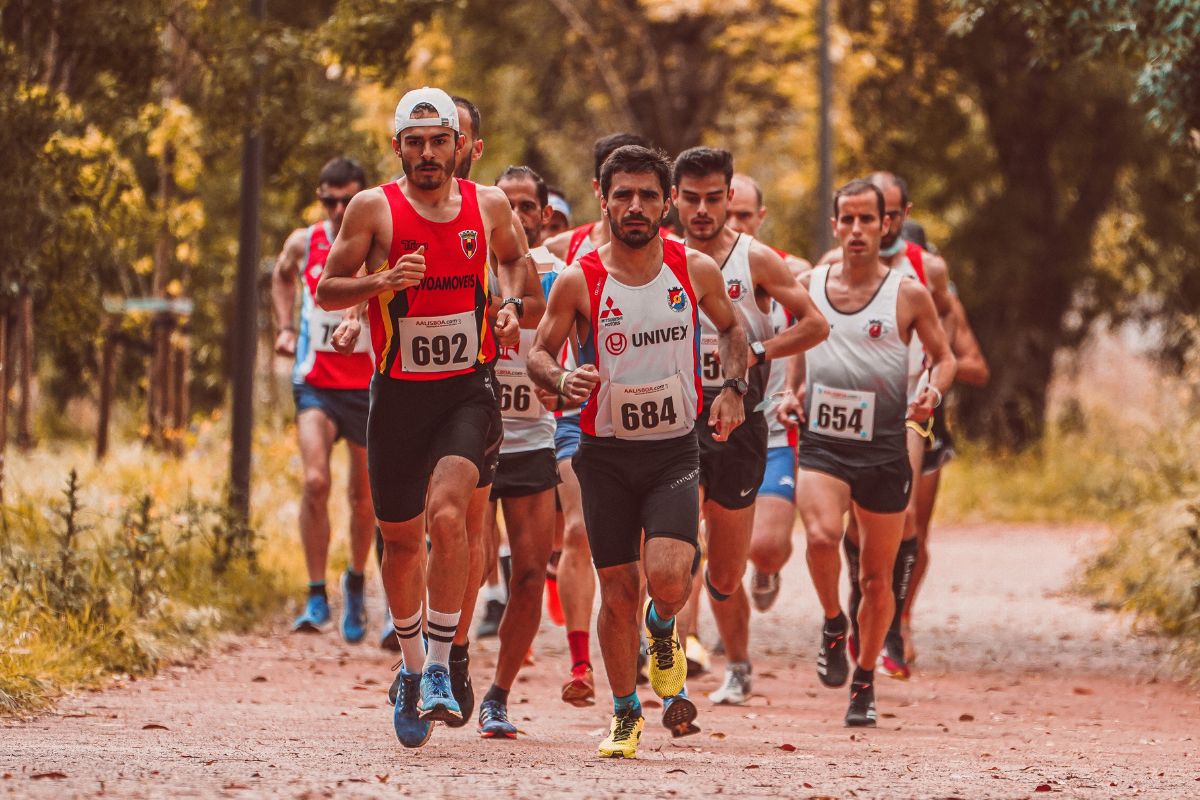There’s no denying that running is an intense sport that pushes both professional athletes and those trying to keep fit to their limits. So much so, there is a lot to understand when it comes to running effectively and completing tough challenges.

One running challenge millions of runners take on every year is the 10K run. Whether it be in competitive racing or training, running a 10K is the perfect challenge for those that have already completed the 5K distance.
However, if you’re a beginner looking to run a 10K for the first time, you might not know what sort of time you should be running and what factors impact your speed.
In this article, we want to help you understand by telling you everything you need to know about 10K running times.
Whether you’ve already taken part in your first 10K and want to know how well you did, or simply want to know what to expect first, we’ve got you covered.
Let’s dive straight in!
How Long Does It Take To Run 10K?
Let’s start by answering the question you came here looking for. How long it takes to run a 10K depends on a number of factors and who you look at.
For example, Olympic athletes can run 10K a lot faster than a beginner taking part in their first 10K. On the other hand, a 20-year-old male will probably run 10K faster than a 60-year-old female.
With that in mind, we’ll show you how long, on average it takes certain groups of people to run a 10K, starting with beginners and regulars.
Regular Runners
Regular runners are capable of completing 10K running distances in 45 to 75 minutes.
Most female runners finish a 10K run in 64 minutes, while most males finish it in 56. As a beginner, you could be looking at a time slightly longer than both of these averages.
However, if you’re a beginner with experience running 5K’s, there’s no reason you couldn’t sit around both of those times. Of course, your time will depend on your fitness levels.
It is also worth noting that females of the same age as men usually run slower. Usually, a male in good shape will run approximately 9 minutes miles, while a female will run roughly 10 and a half minutes miles.
Olympic And Elite Runners
Seen as though you’re a beginner you will almost certainly not finish your 10K in the same sort of time elite and Olympic runners will. However, it’s always nice to know what’s possible if you were to one day reach the highest level.
The best runners in the world have clocked plenty of world record times for running a 10K. Most elite runners are capable of running 10K in under 30 minutes. That gives them an average time of 5 minutes or less per mile.
The current Olympic world record is held by Ethiopian Kenenisa Bekele, who ran a time of 26 minutes and 17 seconds.
The female Olympic record is held by Ethiopian Almaz Ayana, who ran 10K in 29 minutes and 17 seconds. That gives both runners an average time of under 5 minutes per mile.
What Factors Impact A Runner’s Ability To Run?
The time it takes for a runner to complete a 10K isn’t purely based on skill level. There are a whole host of other factors that play a key part in affecting completion time.
It is important to understand these factors as they could play a big part in how long it takes you to complete your race.
Some factors might make you quicker, while others might slow you down. To give you a better understanding, we’ve detailed each factor below.
Gender, Fitness Level, And Age
We’ve briefly touched on age, gender, and fitness above, but it’s important that you fully understand how they can impact your completion time. Age, gender, and fitness play a big part in the human musculoskeletal system.
Musculoskeletal health is imperative to performance. The health of your musculoskeletal system will depend on each of the three factors and your ability to avoid injury and run correctly.
Age comes into play in regard to physical fitness and recovery. A young, healthy runner will usually stay in good shape and recover quicker.
Aged runners that don’t have much experience running will have to take more care when running. They will also have a weaker musculoskeletal system and reduced cardiovascular fitness.
When it comes to gender, you have to remember that the opposite gender will most likely run quicker or slower than you. It makes little sense to compare your times to someone who is already expected to do better or worse.
Racecourse Features And Terrain
Another important factor you have to take into consideration is the racecourse. If the course you find yourself running is flat and straight, you can expect to run one of your best times and potentially beat your personal best.
However, if the course consists of steep hills, dirt paths, fields, and obstacles such as streams, you can expect the race to be a lot harder than usual.
In these instances, you should be prepared to run slower than normal. Even professional athletes won’t hit their personal best when the course is tough.
As a result of this, if you’re a beginner wanting to run the best time, consider entering a race with an easier course.
Weather Conditions
The weather conditions leading up to your run and during it will also impact how fast you complete 10K. If the weather leading up to the race and on the day is perfect, you have a great chance of running a great time.
Alternatively, if the weather is too cold, too hot, or too wet, your time will most likely suffer. That is, of course, unless you have experience running in different conditions.
Running when you’re too hot or too cold can make it harder for your body to run. You might overheat too quickly or simply struggle to get the joints moving effectively.
In wet conditions, you may have to run slower to avoid slipping or falling over.
How You Can Succeed In Your 10K

There is a wide range of effective things you can do to ensure you not only finish your 10K but also achieve a good time. We’ll now take you through those things so that you know how to get yourself prepared.
Follow A Training Plan
While running 10K can be a serious challenge for some beginners, it is something you can easily prepare for by following an effective training program.
If you’ve trained for a 5K before, you’ll already have a good idea of how to train for double the distance.
Treating your training with care and attention, you should comfortably finish your race in good time. Ideally, you should train for 6 weeks. After six weeks of hard preparation, you should be in perfect physical shape.
To plan for your training we recommend starting your preparation in advance. Putting together a training program at short notice will lead to mistakes and a lack of effective training.
Stay Consistent
Once you have your training plan in place, you must stay consistent. Even the very best athletes have up and down days. You can only expect the best performance by staying consistent and following your plan to perfection.
Battling through those tough days and continuing with your program is where you’ll improve your grit and determination to succeed. Tough runs help to build character and make you much stronger mentally.
Take It Easy Too
During your 10K training, it is also important to take it easy at times. Running as hard as you can all the time increases your chances of picking up injuries.
In fact, you might benefit more from a program that includes mostly light runs and a handful of faster workouts.
You can then introduce more intense, longer runs each week. The secret behind effective preparation is to balance both distances. This gives your body more time to recover after each run.
It is worth remembering that your body only prepares and rebuilds muscle when you rest.
Run At A Faster Pace
If you want to build up to a faster pace, you should start by dedicating at least one workout a week to faster training.
This doesn’t mean you have to run yourself into the ground, but instead, it means running faster during one workout a week in intervals of 1 to 2 minutes. In the same session, you should then follow this up with some lighter running.
Doing this for three or four weeks can improve speed. You could then make your sessions more intense by making the intervals longer.
Learn How To Run For Longer
Giving your body time to learn how to run for longer is a good way to improve your ability to run 10K. Running fast is great but if you can’t do it for the full 10K you won’t finish your run. With that in mind, try adding half a mile to a mile onto your longest run.
For example, if you can comfortably run 4 miles now, devote one session a week to running 4.5 to 5 miles. Then you can repeat the process in the weeks that follow, slowly building up to the full 10K distance.
After 3 or 4 weeks, go back to doing the smaller distance again just to give your body time to recover.
Stay Level Headed
Training and running 10K isn’t just about your physical performance. You also need to focus on the mental side of running too.
On race day, your mind is incredibly important and arguably in control. You need to control your nerves and maintain positivity in order to run successfully.
Do everything you can to keep a level head, start effectively, don’t burn too much energy, and power towards the finish line at the end.
Stay Motivated
There will be days when you don’t want to put your running gear on and leave the house. It is during these times that you need to find the motivation to keep going.
By finding that motivation to keep running when you really don’t want to, you’ll be able to run faster than you’ve ever done before and overcome setbacks.
Warm Up
Always do a short warm up before you run. Warming up gets the blood pumping and prepares your muscles for action. This helps to ensure improved performance and avoid injury.
How To Improve Run Time
If you not only want to complete a 10K, but you also want to finish in good time, there are a number of important things to consider. Below, we’ve listed some of the most important things that will help you improve your run time.
Speedwork
What better way to improve your runtime than to focus on speedwork. Different types of speed training such as tempo runs, interval training, and hill training will help you improve fitness levels and performance.
We recommend performing some form of speedwork no more than once a week to avoid injury.
Know The Course
You can easily improve your run time by taking the time to learn the course. By learning the course, you develop an understanding of what to expect and when. You can then tailor specific aspects of the course into your training.
For example, if the course consists of steep hills, you can work on your hill training to ensure you’re ready for action.
Train In Adverse Conditions
To make sure you can adapt to different terrains and weather conditions, you should train in a wide range of adverse conditions. This includes running in heavy rain, cold and hot temperatures, and across different surfaces.
While this may seem pretty strange, you don’t know what you could face when running so it’s best to be prepared for every eventuality.
Get Plenty Of Rest
Ideally, you will give your body one full day a week to rest and recover. It is also a good idea to balance out your running workouts with some yoga at least once a week. This will protect your muscles and keep the body flexible.
Strength Train
Strength training helps build muscles and improve stability. These are both things that will help you run faster. We recommend doing one strength training session a week if possible. If you have time, you could eventually consider doing two a week.
Avoid Alcohol
During your training, you should strongly consider giving up alcohol. Instead, drink plenty of water. This will ensure you’re in the best possible condition when you come to run.
Final Thoughts
Running 10K might not be the easiest of challenges, but it’s certainly one most people will be able to complete.
If you’re a beginner looking to race in a 10K for the first time, a run time between 56 minutes and 1 hour and 4 minutes is a great achievement.
Aside from looking at how long it takes a beginner to run 10K, in this article, we’ve also looked at how you can prepare for a 10K and what you can do to improve run time.
Completing a 10K is a wonderful achievement and one you can be proud of no matter how long it takes.
You might even find that running 10K is the first step in your journey to running much longer distances, so why don’t you start your preparations now!
- Can Dogs Run Faster Than Humans? (Running With Your Furry Friend) - October 4, 2022
- 10 Doggie Fun Runs You Will Love [Ultimate Guide] - October 4, 2022
- What Are Division Results In Running? - October 4, 2022








